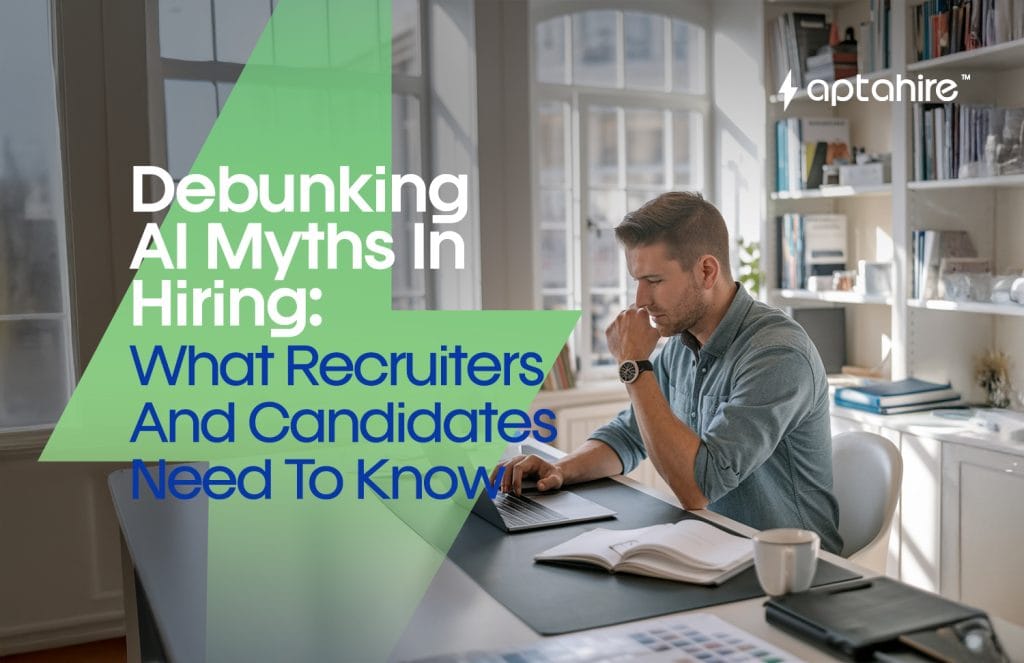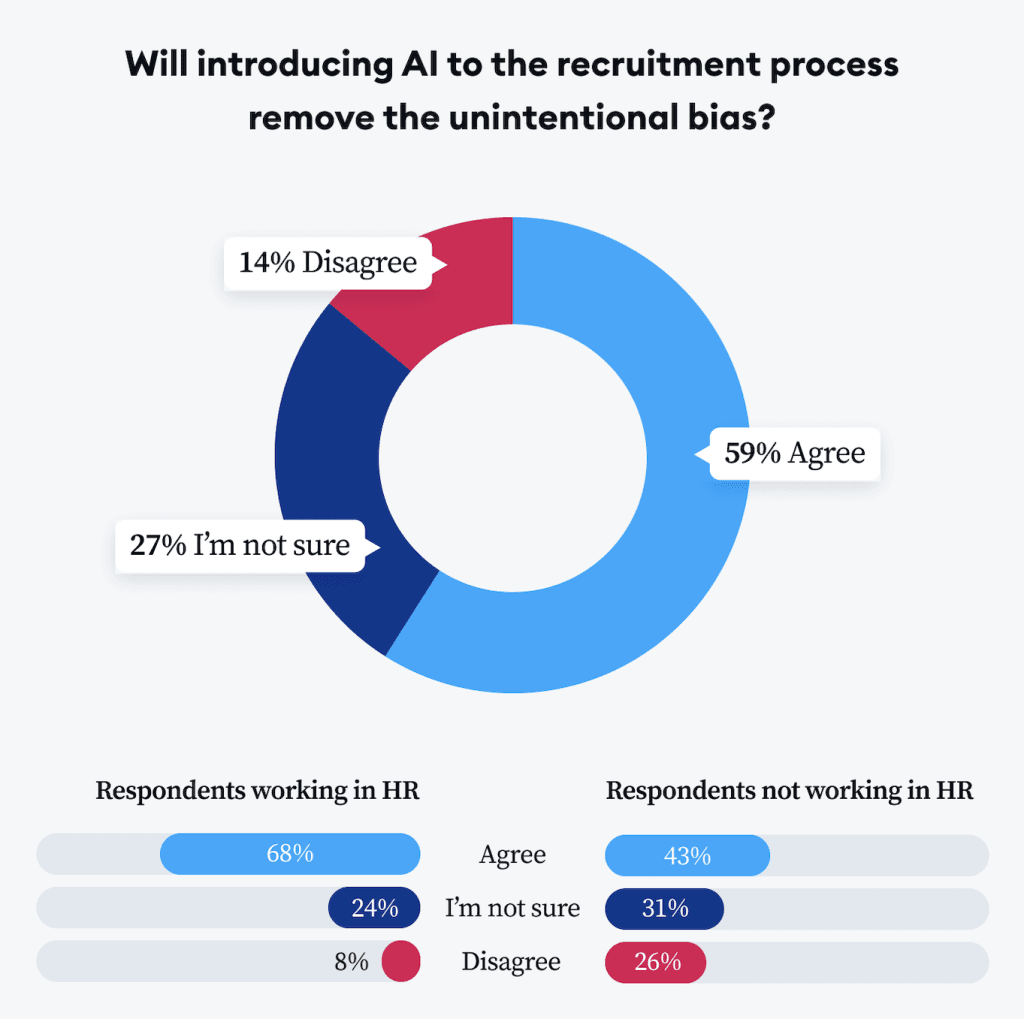Debunking AI Myths in Hiring: What Recruiters and Candidates Need to Know

AI in Hiring: A Game-Changer or a Gimmick?
Artificial Intelligence (AI) has made its way into almost every industry, and hiring is no exception. From scanning resumes in seconds to predicting a candidate’s job performance, AI-driven tools are streamlining recruitment like never before. But with every technological advancement comes a wave of skepticism.
Many recruiters fear losing the human touch in hiring, while candidates worry about being unfairly judged by an algorithm. Some believe AI will make recruitment more biased, while others think it’s only meant for large corporations with deep pockets. These myths and misconceptions can prevent businesses and job seekers from embracing the very technology that could make hiring more efficient and fairer.
So, let’s set the record straight. In this blog where we will be debunking AI myths about AI hiring, we will also uncover how it actually benefits both recruiters and candidates when used correctly.

Myth 1: AI Hiring Will Replace Human Recruiters
A common concern is that AI will render human recruiters obsolete. While AI excels at automating repetitive tasks, such as screening resumes or scheduling interviews, it cannot replicate the nuanced understanding, empathy, and interpersonal skills that human recruiters bring to the table.
Instead of replacing humans, AI serves as a powerful tool to enhance recruiters’ efficiency, allowing them to focus more on building relationships and making informed decisions. As noted by SHRM, “Conversational AI is not intended to replace recruiters but to augment their capabilities and improve efficiency.”
Myth 2: AI Hiring Introduces Bias into the Hiring Process
There’s a widespread belief that AI perpetuates bias in recruitment. It’s true that if AI systems are trained on biased data, they can mirror those biases. However, when designed and monitored correctly, AI can actively reduce bias by focusing solely on candidates’ skills and qualifications, eliminating factors like gender, race, or age.
For instance, AI-driven platforms can analyze job descriptions to ensure they are gender-neutral, promoting a more inclusive hiring process. As highlighted by HackerRank, “If properly programmed and monitored, AI could actually help reduce bias by providing objective assessments and analyses.”
Myth 3: AI Makes Recruitment Impersonal
Some fear that integrating AI into recruitment will strip away the personal touch. In reality, AI handles time-consuming tasks, freeing up recruiters to engage more deeply with candidates.
Moreover, AI-powered tools can personalize interactions by tailoring communication based on individual candidate profiles, enhancing the overall experience. As noted by HeyMilo AI, “By handling redundant tasks, AI frees up time for recruiters to engage more deeply with candidates.”
Myth 4: AI Is Only Beneficial for Large Corporations
There’s a misconception that only large enterprises can afford or benefit from AI in recruitment. However, AI and candidate experience tools are becoming increasingly accessible and scalable, making them suitable for businesses of all sizes.
Small and medium-sized enterprises (SMEs) can leverage AI to streamline their hiring processes, reduce costs, and compete more effectively for top talent. As DecodeHR points out, “AI can support small companies in recruiting people who are a better fit, and who are likely to stay longer.”
Myth 5: AI Cannot Assess Soft Skills
While AI is proficient at evaluating technical skills, there’s skepticism about its ability to gauge soft skills like communication, teamwork, and problem-solving.
Advancements in Natural Language Processing (NLP) and machine learning now enable AI to analyze candidate responses and assess these competencies effectively. Platforms like Pymetrics utilize AI to evaluate emotional and social intelligence through gamified assessments, providing deeper insights into a candidate’s soft skills.
As highlighted by Hey Milo AI, “Platforms like Pymetrics are using AI to evaluate not only technical skills, but also emotional and social intelligence through gamified assessments.”
Myth 6: Implementing AI in Recruitment Is Too Expensive
Many assume that integrating AI into recruitment processes is a costly endeavor. While there is an initial investment, AI can lead to significant cost savings in the long run by reducing time-to-hire and minimizing the chances of making poor hiring decisions.
According to DecodeHR, “AI-enabled platforms… can help minimize costs from poor hires and reduce overall hiring costs by up to 50 percent.”
Myth 7: Candidates Are Uncomfortable with AI-Led Interviews
There’s a perception that candidates might feel uneasy interacting with AI during the recruitment process. However, a survey conducted by Talker Research for Newsweek found that while 43% of Americans are uncomfortable with AI handling job interviews, 32% feel comfortable, and 26% remain undecided.
This indicates a growing acceptance of AI in recruitment, especially among younger generations. As reported by the New York Post, “The survey… found that older generations, particularly baby boomers and Gen X, are more likely to be uncomfortable with AI-led interviews.”
Try Aptahire Today
Hiring the right talent shouldn’t be a time-consuming struggle. With Aptahire, you can simplify and accelerate your recruitment process using cutting-edge AI technology. From automated resume screening to seamless interview scheduling and unbiased candidate assessments, Aptahire ensures you find the best fit efficiently. By eliminating manual bottlenecks, you save time, reduce hiring costs, and improve decision-making.
Whether you’re a growing startup or a large enterprise, Aptahire adapts to your needs, making recruitment smarter and more effective. Don’t let outdated hiring methods slow you down, embrace the future of recruitment. Try Aptahire today and build your dream team effortlessly!
Conclusion: Embracing AI for a Smarter Hiring Future
The rise of AI in hiring is not about replacing recruiters or removing the human touch, it’s about making hiring smarter, faster, and fairer. By debunking these myths, we can shift the narrative from fear to empowerment, helping both recruiters and candidates leverage AI’s full potential.
For recruiters, AI frees up valuable time by automating mundane tasks, allowing them to focus on meaningful candidate interactions. For job seekers, AI can provide a more unbiased and personalized experience, ensuring that skills and qualifications take center stage.
As AI continues to evolve, the key lies in using it responsibly. Companies that embrace AI strategically, while maintaining human oversight, will not only stay ahead in the talent game but also create a more efficient and inclusive hiring landscape. So, instead of fearing AI, it’s time to welcome it as the game-changer that recruitment truly needs.
FAQs
1. What are the problems with AI in hiring?
While AI can enhance hiring efficiency, it comes with challenges. AI algorithms may inherit biases from historical data, leading to unfair hiring decisions. Poorly trained models might misinterpret candidate qualifications or exclude non-traditional applicants. Additionally, lack of transparency in AI-driven decisions can create trust issues among both recruiters and candidates. Over-reliance on automation may also reduce the human touch in hiring, leading to a less personalized experience.
2. How is AI being used in hiring?
AI is transforming hiring by automating repetitive tasks and improving decision-making. Common applications include:
- Resume screening: AI filters resumes based on job descriptions, reducing manual effort.
- Chatbots: AI-powered chatbots engage with candidates, answer FAQs, and schedule interviews.
- Video interview analysis: AI assesses candidates’ speech, tone, and facial expressions to gauge soft skills.
- Predictive analytics: AI predicts candidate success based on past hiring data.
- Job description optimization: AI ensures job postings are inclusive and attract diverse applicants.
3. Does AI reduce bias in hiring?
AI has the potential to reduce bias, but only when implemented correctly. Unlike humans, AI does not have unconscious biases. However, it can reflect biases present in historical hiring data. When properly designed and monitored, AI can help eliminate subjective factors like gender, race, and age from hiring decisions. AI-powered tools also analyze job descriptions to remove biased language, promoting diversity and inclusion. However, continuous human oversight is essential to ensure AI remains fair and unbiased.
4. How does AI affect employment?
AI is reshaping employment by creating efficiencies in hiring but also raising concerns about job displacement. While AI automates certain HR tasks, it does not replace recruiters, it enhances their productivity by allowing them to focus on strategic decision-making and candidate engagement. For job seekers, AI can improve access to opportunities by matching them with roles based on skills and experience rather than traditional credentials. However, AI-driven assessments may also challenge candidates unfamiliar with digital hiring tools, potentially widening the skills gap.
5. What are the risks of AI in recruitment?
AI in recruitment presents several risks, including:
- Bias and discrimination: If AI is trained on biased data, it can reinforce existing hiring inequalities.
- Lack of transparency: Candidates may not understand how AI assesses them, leading to concerns about fairness.
- Over-reliance on automation: Excessive use of AI may depersonalize hiring, reducing meaningful human interactions.
- Privacy concerns: AI collects vast amounts of candidate data, raising concerns about data security and ethical use.
- False negatives: AI might wrongly filter out qualified candidates due to rigid screening algorithms.
